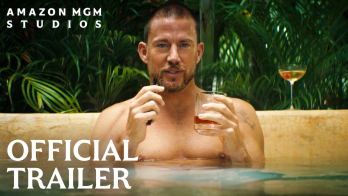We hear stories in the news all the time about people who went to jail for years, and then come to find out, they were innocent the whole time. Prisoners refer to it as getting screwed over by the system.
DETAILS: Strike Out! Lenny Dykstra Gets Three Years In Prison
Award-winning director Jerry Lamothe recently directed the film The Tombs, which shows just how badly the system can screw people over.
After experiencing it himself, Jerry decided to show people what really happens when someone is seen as guilty.
PHOTOS: Is Zoe Saldana The Sexiest Single Woman In The World?
The movie is currently showing at many film festivals around the globe, and has been getting a lot of feedback.
We caught up with Jerry to see what inspired him to make the movie, why he used some of the themes he did, and how he feels about the system.
Check out the interview below and the preview for The Tombs above!
GlobalGrind: Where did you get the idea for The Tombs?
Jerry: In all honesty it’s semi-biographical, so it’s based off experience I encountered several years ago. I was locked up in the tombs over a bogus accusation, and it was really a true eye opener for me. I think I was walking under the illusion that if you walk a certain path and avoid certain situations, you eventually find yourself in that certain situation. We are all looked upon the same way. We are all criminals in the system. Guilty until proven innocent, or like I acknowledged in the movie: guilty until proven guiltier. I acknowledged the bureaucracy and the red tape that exists in the jail system. That pretty much sets you up for failure. People aren’t really concerned about who’s right and who’s wrong. Once you’re in, you’re in. You gotta go through it like everyone else.
There was an interesting line in the movie, “You might as well just plead poverty because you’re going to have to figure out how much they’re charging you for you’re freedom.” Where did that come from? Do you feel it’s sometimes better to plead guilty than to actually fight a case?
That’s a good question. To answer the first part of that, I did realize that other brothers were so willing to share their insight. They’ll share their experience about the system and how the system works. You have your career criminals, and then you have your social activists, who pretty much are breaking it down to you. Me being a new one, I’m trying to have them acknowledge that I’m a working man and professional, thinking that it will make a difference in speeding up my court appearance. When in reality, that whole process is done to determine if they should provide you with bail. If you’re unemployed, you have a better chance of walking home, as opposed to posting $300 – $500 bond because you have a half decent job. That’s the irony of it.
If you should plead guilty, that whole part of the process plays a part in that. It’s almost like an interrogation technique. Making a person sleep deprived is part of the tactics used to really break you down. Spending 3 or 4 days in jail, especially for something you didn’t do, you’d be surprised how you could play guilty just so you could go home or see daylight. When there’s a risk of losing your freedom, sometimes you just got to say, “Fine, I’m guilty.”
Where did you shoot this movie?
We shot it in Brooks City, we shot it in Newark in Essex County Jailhouse. The actual Tombs were too expensive.
The first five minutes of the movie is so chilling! What was your thought process when you were recording that?
I wanted those who have been through it to say, “Wow, that’s authentic.” I wanted them to think that’s exactly what it’s like. For majority, I wanted them to get the sense of helplessness that one gets when going through the system. I wanted them to get the isolation concept of no windows, no reference of time. What I found fascinating about jail was that we’re all made differently. Jail is definitely more mentally decapitating than it is physically. The sense of helplessness and limited space, I wanted people to feel that sense of “wow, I can’t breathe.” I had to constantly make a conscious effort to close my eyes and escape from that, because that’s the aspect that can drive me crazy. None of us can really say, I will never go to prison. That’s something you have to pray about. I try to wake up everyday and avoid something that somebody brings to me.
That’s all it really takes!
You’re going to go through the system regardless. It’s bigger than that. It’s about them being able to know who’s who, the whole process; it’s the big brother watching system.
You went from dark to light in the movie. Why did you do that?
It was a metaphor. Going from darkness to lightness is as time comes and the prisoners are getting closer and closer to freedom. You’re trying to keep your spirit up, you become more enthused and hopeful that you will get to see this judge who will stand and recognize my dilemma and that I didn’t do what I’m being accused of. I found that in The Tombs, the courtroom floor, which is the last floor that you travel to, they do have windows. I really think that that whole process is intentional, not a coincidence. I think that they intentionally set it up that way because your initial times in the tombs is spent underground, with no windows. When you do reach the courtroom floor, to see the judges, you find that there are little pockets of sunlight. I thought that was fascinating and would make good theatrics.
When you were researching, did anyone tell you the importance of that sunlight?
Absolutely. This is my fifth film, but my first short film and it came as a result of desperation. I think all of my films so far have been made out of desperation as a need to be creative and to show my art. When I decided I was going to do a short film, I spoke with my team and I told them that for me to do a short film it has to be something really relevant, and a strong socially conscience message. Hopefully it could bring attention to something unseen. Once I started brainstorming, I remembered what happened 5 or 6 years ago. I always said I was going to do something because as an artist, down the road it’s going to be for something like a performance, or a movie. I thought initially it was going to end up being a documentary. I wanted to tell this story. When the time was right, I thought that this would make a great short film. It’s short, sweet, and to the point. I never necessarily started a feature film anyway, so I felt that it would make a strong piece.
How did you hook up with “The rent is too damn high!” guy?
Here’s the funny thing: I’ve known Jimmy McMillan on the streets as Papa Smurf. Now he’s a politician, he’s the man, but I’ve known him since I was about 8 years old. He used to do security in the ’80s during the Last Dragon era when all the Kung-Fu movies were on Flatbush Avenue. Him and my father had a confrontation in the movie theater because he used to be out front in the Kung-Fu outfit and slippers doing security in the hood. My father tried to come in with some food, rather than buy it at the concession. He told him he couldn’t come in with it, which turned into a little verbal back and forth. They became cool after that, so every time he saw me he would holler at me. I put him in my first film, and we’ve been good ever since.
Over the course of your life, I’m assuming you were the guy who skipped some classes and never got caught, and still passed your classes. How was it to be the guy who escaped all the clutches, and then finally ended up in there over some bull?
It was definitely an eye-opener for me because you’re partially right; I have been one of the dudes who has successfully avoided prison. I wouldn’t say I’ve been a straight A dude, or the cat who didn’t cut school, because that’d be a complete lie. I’ve always been conscious of a lot of my actions because of my parents. Out of respect for them, knowing I am not that dude and to not take it to that extent. There have been moments where I’ve been at the wrong place at the wrong time. God has spared me other times. For the most part, I haven’t really done anything to warrant real prison signs. So it did make me really bitter. It put a chip on my shoulders. It definitely made me think what was the point of that, if at the end of the day we’re all looked upon in the same light anyway. I tried to show that with the protagonist. That’s why the film ends the way it does. Whether he’s guilty or not guilty, I see a man who is tarnished. I hear Pac say that he wasn’t a criminal until he went into prison. Prison is one of the biggest institutes to teach you how to become a criminal.
So what’s the next project for you?
I’m really excited. We’re prepping now for my next film, which is a feature film. It’s a project called “The Promise Keeper.” Basically it’s about two childhood lifelong friends from East Flatbush. One is a Haitian American; one is Haitian. It’s like a coming of age story. They both go in vastly different directions. Basically one becomes an acclaimed writer, the other one a criminal who gets deported back to Haiti. Upon the protagonist finding that out, he goes to Haiti for the first time in his life literally weeks after the earthquake to find out what happened.
You said you have 5 movies, what can we find in these other movies?
My other film prior to “The Tombs” was called “Blackout” with Zoe Saldana and Jeffery Right that came out in 2008. It had a strong ensemble piece. It’s about the infamous blackout that happened in 2003 that effected the whole Northeast.
















